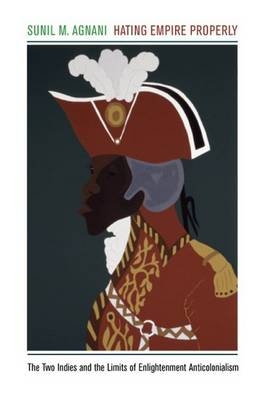
Hating Empire Properly
Fordham University Press (Verlag)
978-0-8232-6739-2 (ISBN)
In Hating Empire Properly, Sunil Agnani produces a novel attempt to think the eighteenth-century imagination of
the West and East Indies together, arguing that this is how contemporary thinkers Edmund Burke and Denis
Diderot actually viewed them. This concern with multiple geographical spaces is revealed to be a largely
unacknowledged part of the matrix of Enlightenment thought in which eighteenth-century European and American self-conceptions evolved. By focusing on colonial spaces of the Enlightenment, especially India and Haiti, he demonstrates how Burke's fearful view of the French Revolution—the defining event of modernity— as shaped by prior reflection on these other domains. Exploring with sympathy the angry outbursts against injustice in the writings of Diderot, he nonetheless challenges recent understandings of him as a univocal critic of empire by showing the persistence of a fantasy of consensual colonialism in his thought. By looking at the impasses and limits in the thought of both radical and conservative writers, Agnani asks what it means to critique empire “properly.” Drawing his method from Theodor Adorno’s quip that “one must have tradition in oneself, in order to hate it properly,” he proposes a critical inhabiting of dominant forms of reason as a way forward for the critique of both empire and Enlightenment.
Thus, this volume makes important contributions to political theory, history, literary studies, American studies, and postcolonial studies.
Sunil M. Agnani is Assistant Professor of English and History at the University of Illinois at Chicago. He has held previous positions at the Princeton Society of Fellows and the University of Michigan.
Prologue: Enlightenment, Colonialism, Modernity Introduction: Companies, Colonies and their Critics Part I Denis Diderot: The Two Indies of the French Enlightenment Chapter 1: Doux Commerce, Douce Colonisation: Consensual Colonialism in Diderot's Thought Chapter 2: On the Use and Abuse of Anger for Life: Ressentiment and Revenge in the Histoire des deux Indes Part II Edmund Burke: Political Analogy and Enlightenment Critique Chapter 3: Between France and India in 1790: Custom and Arithmetic Reason in a Country of Conquest Chapter 4: Jacobinism in India, Indianism in English Parliament Chapter 5: Atlantic Revolutions and their Indian Echoes: The Place of America in Burke's Asia Writings (a) Reflections on the Revolution in Saint Domingue/Haiti (b) Compensation in the East, or, from Virginia to Hindostan Epilogue Hating Empire Properly: European Anticolonialism at its Limit
| Verlagsort | New York |
|---|---|
| Sprache | englisch |
| Maße | 152 x 229 mm |
| Themenwelt | Sachbuch/Ratgeber ► Geschichte / Politik ► Allgemeines / Lexika |
| Geisteswissenschaften ► Geschichte ► Regional- / Ländergeschichte | |
| Geschichte ► Teilgebiete der Geschichte ► Wirtschaftsgeschichte | |
| Geisteswissenschaften ► Philosophie ► Geschichte der Philosophie | |
| Geisteswissenschaften ► Philosophie ► Philosophie der Neuzeit | |
| Sozialwissenschaften ► Politik / Verwaltung ► Politische Theorie | |
| Sozialwissenschaften ► Soziologie | |
| ISBN-10 | 0-8232-6739-3 / 0823267393 |
| ISBN-13 | 978-0-8232-6739-2 / 9780823267392 |
| Zustand | Neuware |
| Haben Sie eine Frage zum Produkt? |
aus dem Bereich


